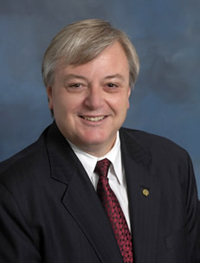"Designer" Catalysts: From Molecular Building Blocks to Active Catalytic Sites and Ensembles
Michael D. Amiridis
Professor and Provost
University of South Carolina
Tuesday, September 16, 2014
Lecture at 4:00 PM
1610 Engineering Hall
1415 Engineering Drive
Reception at 3:30 Engineering Hall Lobby
Conventional methods used for the preparation of supported metal catalysts involve the deposition of the metal precursors from solutions and often provide limited control over the structure and composition of the resulting materials. Hence, the design and synthesis of catalysts with precisely controlled architecture (i.e., size and composition) of the catalytically active metal ensembles remains a major research challenge, especially for multimetallic systems. In this presentation we will review two strategies currently pursued in our group to achieve this goal; more specifically the utilization of organometallic clusters and dendrimer-metal nanocomposites as precursors for the synthesis of "designer" catalysts. The discussion will focus mostly on monometallic Pt and Rh systems prepared according to these techniques, while examples of mutlimetallics of Pt-Au, Pt-Fe and Pt-Ru-Sn will also be addressed briefly. We will describe the molecular processes taking place during the preparation and treatment of (Pt/ Rh)-dendrimer nanocomposites in solution and the available controls for tuning the final properties of supported nanoparticles thus produced. We will also present the synthesis of cluster-derived site-isolated Rh(CO)(H)x complexes with properties resembling those of their homogeneous analogs. Characterization results will be presented suggesting that in all cases a much tighter control can be achieved by the use of the proposed methods, allowing us to claim that unique catalysts can be indeed produced for these widely used catalytic systems.
 |
Dr. Michael D. Amiridis is the Provost of the University of South Carolina and a Professor of Chemical Engineering. As Provost, Dr. Amiridis is responsible for leading the formulation and implementation of academic policy, including coordinating the University's teaching, research, and public service programs; supervision of the allocation of resources in all academic and academic support areas; formulation and implementation of policy with respect to academic employment, promotion, tenure, and faculty development; and representation of the University before external bodies.
Dr. Amiridis received his Diploma in Chemical Engineering from the Aristotelian University of Thessaloniki in Greece (1985), and his PhD – also in Chemical Engineering – from the University of Wisconsin-Madison (1991), specializing in heterogeneous catalysis. In 1991 he joined the corporate Research Division of W.R. Grace and Co., in Columbia, Maryland, working in the area of emission control technologies and subsequently moved to the University of South Carolina as an Assistant Professor in 1994. He was promoted through the academic ranks, became Department Chair in 2002 and Dean of the College of Engineering and Computing in 2006, before becoming the Provost in 2009. In the interim he has also held visiting appointments (sabbaticals) at the University of Poitiers (France) and ETH-Zurich (Switzerland).
His research interests focus on the synthesis and catalytic characterization of bimetallic nanoparticles with controlled composition and architecture. His work has resulted in more than 85 peer-reviewed journal publications and has been funded by the National Science Foundation (NSF), the Department of Energy and the industrial sector (BASF, Toyota, Davison, W.L. Gore and ExxonMobil). Amiridis has so far supervised the completion of 16 doctoral theses, while 6 additional PhD candidates are currently in his research group. Graduates from his group have been hired in world renowned corporate labs of catalyst manufacturers or users, including BASF, Johnson Matthey, Grace-Davison, BP, Shell, ExxonMobil, Chevron, Sabic and Pfizer. His research efforts have been recognized with an NSF CAREER Award (1996), a Golden Key Award for Integration of Undergraduate Teaching and Research (2000), and the USC College of Engineering Research Achievement Award (2005).
Amiridis has taught several courses in kinetics, reactor design and catalysis and has received various College and University Awards for his teaching efforts, including the Michael J. Mungo Undergraduate (1998) and Graduate (2004) Teaching Awards and the Samuel Litman Distinguished Professor Award (2002). He has also been involved in efforts to integrate undergraduate education and research, and has served as the Principal Investigator in five successful NSF-Research Experience for Undergraduate (REU) sites, including the only international Chemical Engineering REU site in the nation (REU-Japan; 2003-2007). His recent service-related activities include the editorship of Catalysis Communications (2001-05), participation in the editorial board of Applied Catalysis B: Environmental and Catalysis Communications, chairing of the Chemical Engineering NSF Graduate Research Fellowships national selection panel (2005-08), chairing of the Science Foundation of Ireland Executive PI Panel in Information, Communication and Emergent Technologies (2008-10). He also serves on national advisory committees for the Departments of Chemical and Biological Engineering at the University of Wisconsin and Tufts University.
